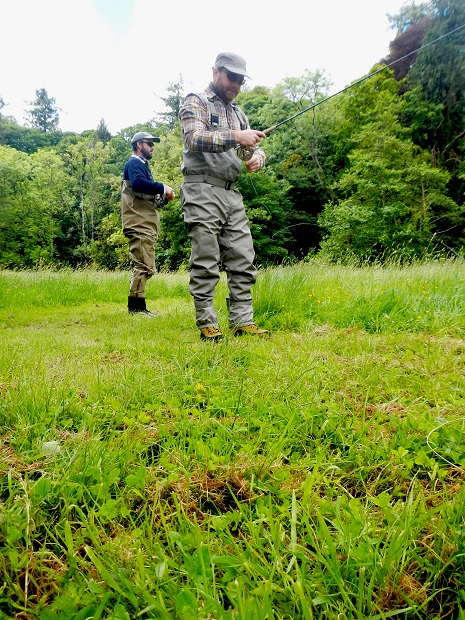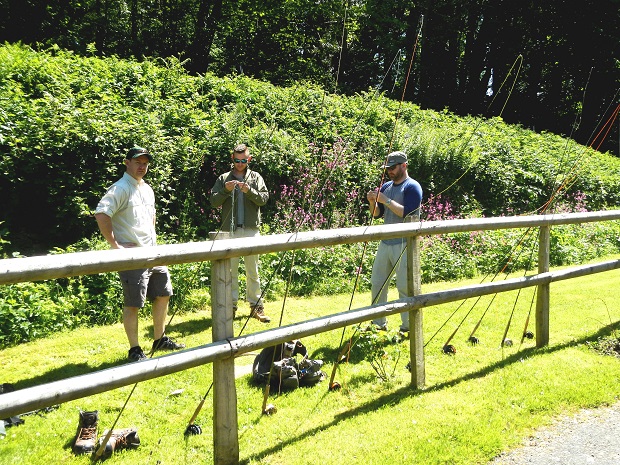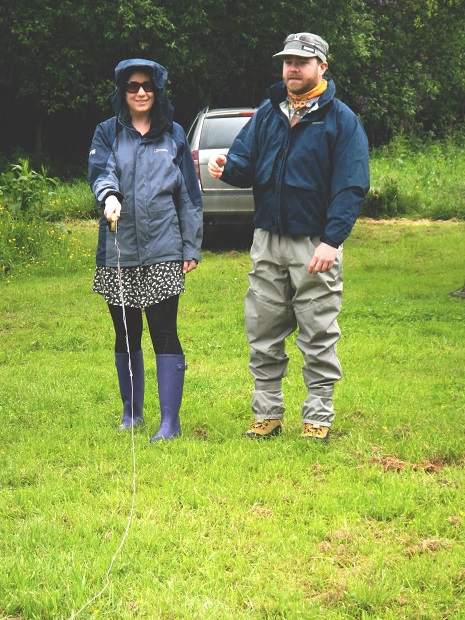James Beeson is an excellent fly angler and good company on the water. We asked him along to see what it was like to be a fly fishing guide for the day. Is it the dream job for any fly angler?
At the beginning of May I had a phone call from Pete, who when he’s not pouring his energies into the magazine runs the Devon School of Fly Fishing based at the Fox & Hounds Country Hotel.
’Why don’t you come and give us a hand with a group booking,’ he said, ‘and then you can write something about what it’s really like to be a guide for the magazine.’
‘Sounds like a great idea,’ I said, and I thought it was.
 I have always thought that a job in fly fishing was a good thing to have, though Pete regularly warns that it leads to little time for actual fishing. I’ve tried to reduce the influence of work on my life but I still find it necessary to earn money. Money buys rods (occasionally), permits (annually), and pasties (monthly). Working helps to pay the mortgage and feed the cat (he doesn’t eat pasties). Here was an opportunity to test the idea of a fly fishing job. In the days after agreeing I sometimes imagined myself standing at my sport’s shoulder with one foot resting on rock, offering sage advice, and striking the same pose as George Washington when he crossed the Delaware in that drift boat. At other times I imagined mass-drownings, total nervous collapse, and the destruction of the reputation of the Devon School of Fly Fishing that Pete has worked so hard to establish. I was excited.
I have always thought that a job in fly fishing was a good thing to have, though Pete regularly warns that it leads to little time for actual fishing. I’ve tried to reduce the influence of work on my life but I still find it necessary to earn money. Money buys rods (occasionally), permits (annually), and pasties (monthly). Working helps to pay the mortgage and feed the cat (he doesn’t eat pasties). Here was an opportunity to test the idea of a fly fishing job. In the days after agreeing I sometimes imagined myself standing at my sport’s shoulder with one foot resting on rock, offering sage advice, and striking the same pose as George Washington when he crossed the Delaware in that drift boat. At other times I imagined mass-drownings, total nervous collapse, and the destruction of the reputation of the Devon School of Fly Fishing that Pete has worked so hard to establish. I was excited.
The day of the booking was hot and bright. The group was made up of twelve grown men from Kent on a corporate weekend away. They were to be looked after by the awesome foursome of Pete, Lewis, Paul, and me. Naturally comparisons were drawn between us and that other famous four man band, the A-Team. That Pete is Hannibal was confirmed by the gift of a Fox & Hounds ashtray he had received the day before, Lewis is obviously Face. That left Paul and me to fill the shoes of B.A. and Murdock, but I’m not sure which of us is supposed to be which.
Rigging up twelve fly rods and carrying twelve pairs of waders down from the shed was warm work even in breathable chesties. The grass field between the hotel and the river was long grass on either side of a narrow mown strip, like a reverse Brazilian. This is Pete’s classroom.
Everyone gathered round to watch a demonstration in the basic mechanics of fly casting. It begins with examples of how to grip the rod, the correct stroke path, and what good loops look like. It finishes with some examples of how not to do it.
Pete makes good casting look effortless and even his deliberately bad attempts still turn out half-decent. I get the feeling that I ought to work on improving my own stroke, or else only give examples of what not to do.

The demonstration ends and the crowd breaks off to practice on their own with one of the twelve ready rigged rods. The A-Team moves among them, offering help and advice where needed, which is almost everywhere. I figure there isn’t much point hanging back and staring at my shoes like the shy kid at the disco so I jump right in.
The rod nearest me is having trouble getting any length of line out. The problem is easy to diagnose. He is pulling line with his left-hand, but rather than pulling it from the reel he’s puling it through the rod rings. The shorter the line gets, the more he pulls. I show him how to take line from the reel and lengthen his line for him so that he’s up and running.
The next rod is gripping the handle like a squash racket and trying to serve a forward cast with very little back lift. After addressing the right way to grip the rod we put a bit of acceleration and stop in the back cast. It doesn’t reach gold medal standard but the line begins to fly out more-or-less straight. Confidence begins to grow, both mine and the new casters. It feels good to have helped even just a little.
Having got everyone to use a rod the next thing is to get them into waders and take them to the water. Lewis gives an excellent stream side presentation on where fish might lie and the kind of food items that might be available to them. It’s obvious that he’s given demonstrations like this a thousand times over but also that he cares very much about getting it right, about giving everyone the information they need to give themselves a chance of a fish. Lewis is a natural, as is Pete who plays the role of the trout.
The final step is to get everyone on the river and put all the learning into practice. Pete, Lewis, and Paul have done it all before, they know what they’re doing, but for me it’s a new and nerve-wracking experience. Pete puts three guys, Dave, Chris, and Rich, into a stretch and asks me to look after them. I try to remember the Golden Rules of Guide School but all I can hear in my head is the Grange Hill theme tune.
We start off with some mayfly patterns in the hope that the trout will be tuned in to the kind of large offering that can make them a bit silly. When that doesn’t work we hang some nymphs and try a range of dries both imitative and attractor. Taw trout can be a tough crowd.
 The standard of casting takes a short dip as Dave, Chris, and Rich get used to the added challenge of moving water. The difference between casting practice on grass and casting upstream in a river when line has to be retrieved and shot, drag countered, and distances increased is the difference between learning to play the piano and learning to play the piano while riding a unicycle. It takes a bit of getting used to.
The standard of casting takes a short dip as Dave, Chris, and Rich get used to the added challenge of moving water. The difference between casting practice on grass and casting upstream in a river when line has to be retrieved and shot, drag countered, and distances increased is the difference between learning to play the piano and learning to play the piano while riding a unicycle. It takes a bit of getting used to.
I start out with Chris in the bottom pool and work my way up through Rich and Dave, pointing out places I think might hold fish and how I would put a fly in front of them. Halfway up the second pool a fish rises against the far bank, Rich and I get excited. The trouble with excitement is that it can lead to bad casting. Learning to control excitement is probably one of the easiest ways to catch more fish. Unfortunately we’re new to it all and the cast doesn’t go to plan. Another easy way to catch more fish is to not overreact to a bad cast but let it fish out before trying again. I probably should have said that to Rich before he took the shot. His cast lands wide and he rips it off immediately to start again. It’s not his fault that trout is spooked, it’s mine.
It’s no good standing there thinking about how you could do it all so much better, that’s not the game. The game is to put someone in a position where they have the best chance possible of catching that fish themselves. There are plenty of things that experienced fly fishers understand and take for granted, teaching someone else means remembering that and passing on the lessons you’ve learned the hard way as clearly as possible. If the person you’re guiding does catch it’s about marking their achievement, boosting their confidence and fly fishing ego, not yours. And it’s bloody hard work.
I spend most of the afternoon running up and down the river to tie on new flies, untangle or rebuild leaders, and offer as much guidance and encouragement as I can. The fishing is tough and as morale wanes I break out my own personal stash of Jelly Babies to try and lift our spirits.
At the end of the day, as the group start heading back towards the hotel bar in ones and twos, Dave has stayed behind a bit longer on my suggestion that we might have another crack at that riser from earlier in the day.
‘Go on, show us how it’s done,’ he says and offers me the rod.
It is tempting, having watched for so long, but I remember the First Rule of Guide School: Guides don’t fish. It might be that I could get a cast in tight to the snag and draw that trout out but I don’t want to. What I want is for Dave to catch it. His casting has improved loads since the beginning and I believe he can do it.
‘You’ve got this one,’ I say. There’s nothing wrong with the presentation but the fish doesn’t come. I think about changing flies, but Dave is tired and ready to join the others in the bar. I’m disappointed, despite the improvement and the Jelly Babies, I wanted one of my guys to catch, I don’t like failure but I feel like I’ve tried everything I could think of and some days just aren’t meant to be.
It’s been a tough day. While we break down the rods and hang the waders the four of us relate how our charges got on. A few fish were caught, Pete and Lewis managed to winkle some out for a few of the guys, but it’s been hard for everyone. It’s a hard job. There’s no glamorous side to guiding and I think it might even be a little dangerous, turning fly fishing into work. I wonder if working on the river doesn’t take away some of its healing power. But the hard work isn’t without its rewards, helping people to learn, introducing them to the joy of fly fishing, maybe even being there when they catch their first fish. As Pete always says, ‘I love it when a plan comes together.’
Read more from James Beeson